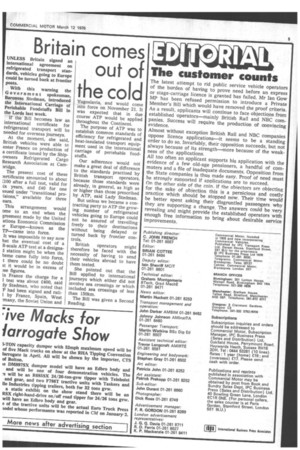Britain comes out of the col
Page 7

If you've noticed an error in this article please click here to report it so we can fix it.
.INLESS Britain signed an nternational agreement on efrigerated transport stanlards, vehicles going to Europe :ould be turned back at frontier wsts.
With this warning the "io vernment spokesman, laroness Stedman, introduced he International Carriage of ?erishable Foodstuffs Bill in he Lords last week.
If the Bill becomes law an nternational certificate for efrigerated transport will be ieeded for overseas journeys.
At the moment, she said, British vehicles were able to niter France on production of certificate issued by the Shipowners Refrigerated Cargo Research Association at Camridge, The present cost of these ,ertificates amounted to about :100 after a full test, valid for ix years, and £40 for one ssued under "transitional proisions," available for three ears.
This arrangement would ante to an end when the greement made by the United ations Economic Commission 1r Europe—known as the TP—came into force.
It was impossible to say now hat the eventual cost of a 11-scale ATP test at a designa station might be when the heme came fully into force, t there could be no doubt it it would be in excess of )se figures.
fn. France the charge for a 1 test was about £400, said ly Stedman, who noted that P had been signed and rati I by France, Spain, West 'many, the Soviet Union and Yugoslavia, and would come into force on November 21. It was expected that in due course ATP would be applied throughout the Continent.
The purpose of ATP was to establish common standards of efficiency for refrigerated and heat-insulated transport equipment used in the international carriage of perishable foodstuffs.
Our adherence would not make a great deal of difference to the standards practised by British transport operators, because those standards were already, in general, as high as or higher than those prescribed by ATP, said Lady Stedman.
But unless we became a contracting party to ATP the growing number of refrigerated vehicles going to Europe could not be assured of travelling freely to their destinations without being delayed or turned back by frontier controls.
British operators might therefore be faced with the necessity of having to send their vehicles abroad to have them tested.
She pointed out that the Bill applied to international journeys which either did not involve sea crossings or which included sea crossings of less than 150km.
The Bill was given a Second Reading.
















































































































